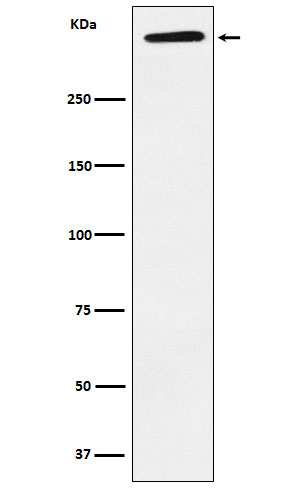
| WB | 1/1000-1/2000 | Human,Mouse,Rat |
| IF | 咨询技术 | Human,Mouse,Rat |
| IHC | 咨询技术 | Human,Mouse,Rat |
| ICC | 技术咨询 | Human,Mouse,Rat |
| FCM | 咨询技术 | Human,Mouse,Rat |
| Elisa | 咨询技术 | Human,Mouse,Rat |
| Aliases | AK38; APOA; apolipoprotein(a); LP; lp(a); LPA;;Apolipoprotein A |
| WB Predicted band size | Calculated MW: 227 kDa ; Observed MW: 501 kDa |
| Host/Isotype | Rabbit IgG |
| Antibody Type | Primary antibody |
| Storage | Store at 4°C short term. Aliquot and store at -20°C long term. Avoid freeze/thaw cycles. |
| Species Reactivity | Human |
| Immunogen | A synthesized peptide derived from human Apolipoprotein A |
| Formulation | Purified antibody in PBS with 0.05% sodium azide,0.05% BSA and 50% glycerol. |
+ +
以下是3篇关于ApoA抗体研究的参考文献概述(基于公开数据整理,非实时数据库检索):
---
1. **文献名称**:*Autoantibodies against apolipoprotein A-1 as potential biomarkers in cardiovascular diseases*
**作者**:Vuilleumier, N., et al.
**摘要**:研究ApoA-I自身抗体在动脉粥样硬化中的作用,发现其与炎症反应和心血管疾病风险相关,提示其可能作为疾病生物标志物。
2. **文献名称**:*Development of a high-sensitivity ELISA for quantification of human apolipoprotein A-I*
**作者**:Zhang, Y., et al.
**摘要**:报道一种基于单克隆抗体的高灵敏度ELISA检测方法,用于定量人血清中ApoA-I,验证其在临床诊断中的应用潜力。
3. **文献名称**:*Anti-apolipoprotein A-1 antibodies in chronic kidney disease: a link with inflammation*
**作者**:Batuca, J.R., et al.
**摘要**:探讨慢性肾病患者中ApoA-I抗体的水平与全身炎症的关系,揭示其在慢性疾病中的病理生理学意义。
---
如需具体文献,建议通过PubMed或Google Scholar检索标题及作者获取全文。
**Background of ApoA Antibodies**
Apolipoprotein A (ApoA) is a key structural and functional component of high-density lipoprotein (HDL), playing a critical role in cholesterol metabolism and cardiovascular health. The ApoA family, primarily ApoA-I and ApoA-II, facilitates reverse cholesterol transport by mediating HDL assembly and interacting with cellular receptors. ApoA-I, the major protein in HDL, promotes cholesterol efflux from peripheral tissues to the liver for excretion, while ApoA-II modulates HDL stability and metabolism.
Antibodies targeting ApoA subtypes (e.g., anti-ApoA-I, anti-ApoA-II) are essential tools for studying HDL biology and its link to diseases like atherosclerosis. These antibodies enable the detection, quantification, and functional characterization of ApoA proteins in assays such as ELISA, Western blotting, and immunohistochemistry. In research, they help investigate how ApoA levels or mutations correlate with cardiovascular risk, inflammation, or metabolic disorders.
Clinically, autoantibodies against ApoA-I have been implicated in autoimmune conditions and cardiovascular pathologies, serving as potential biomarkers for disease progression. Therapeutic strategies leveraging ApoA mimetics or recombinant ApoA also rely on antibody-based validation. However, variability in antibody specificity (monoclonal vs. polyclonal) and cross-reactivity across species requires careful validation to ensure experimental accuracy. Overall, ApoA antibodies remain pivotal in advancing both basic research and translational applications in lipid metabolism and cardiovascular disease.
×